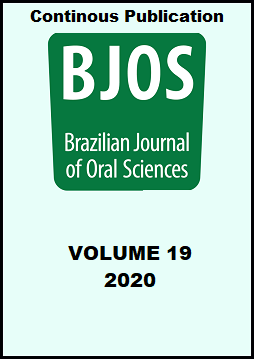Abstract
Determining oral health-related quality of life in elderly patientswith removable prostheses who have increased difficulty inreporting oral issues is imperative for a successful rehabilitation.Aim: Our objective is to assess the extent to which a trace,or personality dimension, can influence oral health-relatedquality of life (OHRQoL) in rehabilitated patients. Methods:135 participants rehabilitated with removable prosthesis wereevaluated in the Clinical Unit of Removable Prosthodontics ofthe Faculty of Dental Medicine of Porto University, Portugal. TheOral Health Impact Profile (OHIP-14) questionnaire was appliedto evaluate oral health-related quality of life, along with theEysenck Personality Inventory (E.P.I.) to determine a personalitytrait. Statistical analysis was carried out using Mann-Whitney,Student’s t-test, Spearman’s rho and linear regression. Results:No statistical correlation was found concerning age, gender andoral health-related quality of life. Regarding the latter, the highestagreement was found on the question involving “pain in teeth”.The prevalence of acrylic partial dentures, as opposed to partialdentures with metallic framework, was substantially higher. Nosignificant association between both extraversion/neuroticism(E.P.I.) and oral health-related quality of life (OHIP-14) uponrehabilitation with removable prostheses was found (p>0,05).In our study, personality traits neuroticism and extraversion didnot influence oral health-related quality of life with removableprostheses. However, we should not overlook the importance ofother psychological factors (such as motivation or perception)and their role in determining oral health-related quality of life.Conclusion: Personality traits “extraversion” and “neuroticism”did not influence oral health-related quality of life.
References
Mostofsky DI, Forgione AG, Giddon DB. Behavioral dentistry. Ames, IO: Wiley-Blackwell; 2006.
House JE. Complete denture department--review and future. Alumni Bull Sch Dent Indiana Univ. 1967 Fall:8-9, 38.
House JE. Promoting a denture practice. Alumni Bull Sch Dent Indiana Univ. 1970 Spring:42-6.
Winkler S. House mental classification system of denture patients: the contribution of Milus M House. J Oral Implantol. 2005;31(6):301-3. doi: 10.1563/0-783.1.
House MM. Studies in prosthesis. J Am Dent Assoc. 1931;18:827-52.
House MM. Art -- fundamental in denture prosthesis. J Am Dent Assoc. 1938;24:406-22.
Winkler S. Psychological aspects of treating complete denture patients: their relation to prosthodontic success. J Geriatr Psychiatry Neurol. 1989 Jan-Mar;2(1):48-51. doi: 10.1177/089198878900200110.
ALLPORT GW. The open system in personality theory. J Abnorm Soc Psychol. 1960 Nov;61:301-10. doi: 10.1037/h0043619.
Ewen RB. An introduction to theories of personality. 7. ed): Psychology Press; 2009.
Eysenck SB, Eysenck HJ, Claridge G. Dimensions of personality, psychiatric syndromes, and mathematical models. J Ment Sci. 1960 Apr;106:581-9. doi: 10.1192/bjp.106.443.581.
Allport GW. Personalistic psychology as science; a reply. Psychol Rev. 1946 Mar;53:132-5. doi: 10.1037/h0058477.
Eysenck HJ. Biological basis of personality. Nature. 1963 Sep 14;199:1031-4. doi: 10.1038/1991031a0.
Cattell RB. Advances in the measurement of neuroticism and anxiety in a conceptual framework of unitary-trait theory. Ann N Y Acad Sci. 1962 Oct;93:815-39. doi: 10.1111/j.1749-6632.1962.tb30509.x.
Hall CS, Lindzey G, Loehlin JC, Manosevitz M, Locke VO. Introduction to Theories of personality. John Wiley & Sons; 1985.
Sobolik C, Larson H. Predicting denture acceptance through psychotechnics. J Dent Educ. 1968;32:67-72.
Nairn RI, Brunello DL. The relationship of denture complaints and level of neuroticism. Dent Pract Dent Rec. 1971 Jan;21(5):156-8.
Smith M. Measurement of personality traits and their relation to patient satisfaction with complete dentures. J Prosthet Dent. 1976 May;35(5):492-503. doi: 10.1016/0022-3913(76)90043-3.
Klages U, Esch M, Wehrbein H. Oral health impact in patients wearing removable prostheses: relations to somatization, pain sensitivity, and body consciousness. Int J Prosthodont. 2005 Mar-Apr;18(2):106-11.
Scott BJ, Forgie AH, Davis DM. A study to compare the oral health impact profile and satisfaction before and after having replacement complete dentures constructed by either the copy or the conventional technique. Gerodontology. 2006 Jun;23(2):79-86. doi: 10.1111/j.1741-2358.2006.00112.x.
Zani SR, Rivaldo EG, Frasca LC, Caye LF. Oral health impact profile and prosthetic condition in edentulous patients rehabilitated with implant-supported overdentures and fixed prostheses. J Oral Sci. 2009 Dec;51(4):535-43. doi: 10.2334/josnusd.51.535.
Serra AS, Ponciano E, Freitas JF. [Results of applying the Eysenck Personality Inventory to a sample of the Portuguese population]. Psiquiat Clin. 1980;1(2):127-32. Portuguese.
Serra AS, Gomes FE. [Results of applying the Maudsley Personality Inventory to a Portuguese sample of normal individuals]. Coimbra Med. 1973;20(8):859-73. Portuguese.
Al Shamrany M. Oral health-related quality of life: a broader perspective. East Mediterr Health J. 2006 Nov;12(6):894-901.
Berg E, Johnsen TB, Ingebretsen R. Psychological variables and patient acceptance of complete dentures. Acta Odontol Scand. 1986 Feb;44(1):17-22. doi: 10.3109/00016358609041293.
Smith JP, Hughes D. A survey of referred patients experiencing problems with complete dentures. J Prosthet Dent. 1988 Nov;60(5):583-6. doi: 10.1016/0022-3913(88)90218-1.
Gamer S, Tuch R, Garcia LTMM. House mental classification revisited: Intersection of particular patient types and particular dentist's needs. J Prosthet Dent. 2003 Mar;89(3):297-302. doi: 10.1067/mpr.2003.49.
al Quran F, Clifford T, Cooper C, Lamey PJ. Influence of psychological factors on the acceptance of complete dentures. Gerodontology. 2001 Jul;18(1):35-40. doi: 10.1111/j.1741-2358.2001.00035.x.
Bolender CL, Swoope CC, Smith DE. The Cornell Medical Index as a prognostic aid for complete denture patients. J Prosthet Dent. 1969 Jul;22(1):20-9. doi: 10.1016/0022-3913(69)90268-6.

This work is licensed under a Creative Commons Attribution 4.0 International License.
Copyright (c) 2020 Brazilian Journal of Oral Sciences


